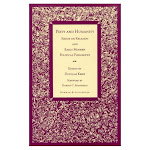
"The Parable of the Vineyard" (Matthew 21:33-46)
by John S. C. Abbott & Jacob Abbott, Illustrated New Testament (1878)
A Nebraska state senator is suing God, WORLD Magazine reports.
Nebraska state Sen. Ernie Chambers, 38, has filed suit against God for causing "widespread death, destruction and terrorization of millions upon millions of the Earth's inhabitants." He claims the litigation is meant to make a serious point about equal access to the court system. But the senator's past criticism of Christians and regular habit of skipping morning prayers during the legislative session suggest that other forces are at work.
The court has threatened to dismiss the lawsuit due to its inability to serve God with notice. But Chambers argues that courts routinely acknowledge God's omniscience and omnipresence while swearing in witnesses and therefore should recognize that God is already aware of the proceedings and will be present for all hearings. ("God on Trial," Aug. 23, 2008; p.14)
This is ironic in the extreme. Imagine a domestic servant who steals from the employer, breaks his stuff, curses him continually, abuses the other servants, acts like he owns the place, never does his job except by accident when it happens to coincide with the servant's own plans, and finally humiliates and even kills the employer's son--his only son, whom he loves. Then when the employer brings consequences to bear upon the servant, not so much in punishment (that is held over until later, if necessary) as in chastisement, the servant sues the employer for unsafe living conditions.
The completely self-serving servant refuses to recognize the food, clothing, shelter, protections and steady flow of comfortable amenities that the employer continues graciously to supply. Moreover, the employer even offers peace and amnesty by transferring the servant's debt of punishment to employer's own son.
And, of course, these chastisements are nothing compared to what the servant deserves: expulsion into the cruel outdoors.
In short, it is we who stand condemned before God--in all his goodness.
Do you suppose, O man—you who judge those who practice such things and yet do them yourself—that you will escape the judgment of God? Or do you presume on the riches of his kindness and forbearance and patience, not knowing that God's kindness is meant to lead you to repentance? But because of your hard and impenitent heart you are storing up wrath for yourself on the day of wrath when God's righteous judgment will be revealed. (Romans 2:3-5 ESV)
But, in contrast to sinful human beings, there is mercy and grace before God's righteous seat of judgment...and it centers entirely in the person of Jesus Christ the Savior.
For God so loved the world, that he gave his only Son, that whoever believes in him should not perish but have eternal life. For God did not send his Son into the world to condemn the world, but in order that the world might be saved through him. Whoever believes in him is not condemned, but whoever does not believe is condemned already, because he has not believed in the name of the only Son of God.
And this is the judgment: the light has come into the world, and people loved the darkness rather than the light because their works were evil. For everyone who does wicked things hates the light and does not come to the light, lest his works should be exposed. But whoever does what is true comes to the light, so that it may be clearly seen that his works have been carried out in God. (John 3:16-21 ESV)
That is news you won't find in the mainstream media.
 I find that Evangelical college students do not know old hymns. Thus they do not sing the praises of the church throughout the ages. Also as a consequence, they miss out on the theological depth and worshipful instruction that is found is many of these hymns.
I find that Evangelical college students do not know old hymns. Thus they do not sing the praises of the church throughout the ages. Also as a consequence, they miss out on the theological depth and worshipful instruction that is found is many of these hymns.



